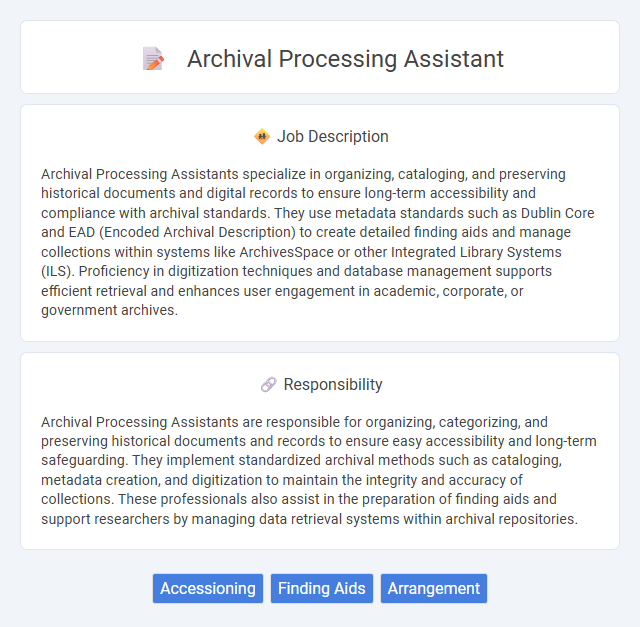
Archival Processing Assistants specialize in organizing, cataloging, and preserving historical documents and digital records to ensure long-term accessibility and compliance with archival standards. They use metadata standards such as Dublin Core and EAD (Encoded Archival Description) to create detailed finding aids and manage collections within systems like ArchivesSpace or other Integrated Library Systems (ILS). Proficiency in digitization techniques and database management supports efficient retrieval and enhances user engagement in academic, corporate, or government archives.
Individuals who are detail-oriented and comfortable working with historical documents or sensitive materials might be well-suited for an Archival Processing Assistant position. Those who prefer structured environments and have patience for organizing and cataloging may probably find this role fulfilling. Candidates experiencing high stress or discomfort with repetitive tasks may be less likely to thrive in this job.
Qualification
An Archival Processing Assistant must possess a strong foundation in archival science, including knowledge of cataloging standards such as DACS and MARC. Proficiency in digital asset management systems and metadata creation is essential for organizing and preserving collections accurately. Attention to detail, excellent organizational skills, and experience with digitization techniques enhance the ability to support archival processing efficiently.
Responsibility
Archival Processing Assistants are responsible for organizing, categorizing, and preserving historical documents and records to ensure easy accessibility and long-term safeguarding. They implement standardized archival methods such as cataloging, metadata creation, and digitization to maintain the integrity and accuracy of collections. These professionals also assist in the preparation of finding aids and support researchers by managing data retrieval systems within archival repositories.
Benefit
An Archival Processing Assistant likely improves organizational efficiency by systematically organizing and preserving valuable records, which may enhance long-term accessibility and reduce information retrieval time. This role probably supports research and historical projects, increasing the accuracy and completeness of archived materials. Being part of this position can offer valuable experience in archival science, potentially advancing career opportunities in libraries, museums, or historical institutions.
Challenge
Archival Processing Assistant roles likely present challenges such as managing large volumes of diverse materials that require meticulous organization and cataloging. The position probably demands strong attention to detail to ensure historical accuracy and compliance with archival standards. Navigating outdated or fragile documents may also pose difficulties, requiring careful handling and preservation techniques.
Career Advancement
Archival Processing Assistants play a crucial role in organizing, cataloging, and preserving historical documents and records, which builds foundational expertise essential for career advancement in archival science. Gaining proficiency in archival software, metadata standards, and document preservation techniques positions professionals for promotion to archival technician, archivist, or records manager roles. Experience in handling diverse collections and contributing to digitization projects enhances opportunities for leadership roles within museums, libraries, and government agencies.
Key Terms
Accessioning
Archival Processing Assistants specialize in accessioning, meticulously documenting and organizing incoming collections to ensure accurate records and seamless integration into archival systems. They verify provenance, assign unique identifiers, and create detailed finding aids to enhance accessibility and preservation. Mastery of archival standards such as DACS and familiarity with digital cataloguing tools are essential for efficient accessioning workflows.
Finding Aids
Archival Processing Assistants specialize in creating detailed finding aids that enhance the accessibility and organization of archival collections. These professionals meticulously arrange, describe, and catalog materials to ensure efficient retrieval and comprehensive documentation. Their expertise in metadata standards and archival software supports researchers and institutions in navigating extensive historical records.
Arrangement
Archival Processing Assistants specialize in the arrangement of historical documents and records to ensure systematic organization and easy retrieval. They apply established archival principles to categorize materials based on provenance, original order, and record series, enhancing the accessibility and preservation of collections. Expertise in metadata standards and cataloging software supports efficient arrangement workflows and comprehensive archive management.
 kuljobs.com
kuljobs.com